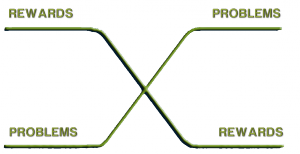 A brief followup to a previous post about one woman’s experience with addiction to Adderall. Here’s the article that started the discussion.
A brief followup to a previous post about one woman’s experience with addiction to Adderall. Here’s the article that started the discussion.
“Like many of my friends,” the article began, “I spent years using prescription stimulants to get through school and start my career. Then I tried to get off them.”
And that’s a good description of the experience of many who suffer from addictive disease. In the beginning, you get the results you want from use of the drug. Over time, that changes. The rewards mysteriously diminish, while problems escalate. It’s a process that can occur quickly, in the first couple years of use. For others, it can be so gradual as to go largely unnoticed.

Then comes a point when, for one reason or another– be it health, finances, career, relationships, whatever– you come to the decision that it would be better if you stopped using. You know you’ll miss it, but you’ve made up your mind, and that’s that.
Then, perhaps for the first time in earnest, you attempt to stop. And discover you can’t. At least not for very long.
“It’s the worst feeling you can imagine,” one client emphasized. “To realize that you’re not actually in control. And probably haven’t been, for a long time.” Even more frustrating, I imagine, if you’re one of the many, many individuals who turned to the drug for seemingly legit reasons– for relief of pain or insomnia or depression or anxiety, let’s say– with a doctor’s blessing, and the presumption of safety.
And instead, look what’s happened.
That’s the mystery: Not why some people become addicted to certain substances, but why others do not. It’s that selectivity that confuses the public. And leads them to the mistaken conclusion that it’s will power that makes the difference.
People in the grip of addiction are not weak willed. But their will is now operating in the service of the addiction.
“It felt like a war for control of my brain,” claimed another client. “And I’m losing. I’d promise myself I was going to stop, break it an hour later, make another promise, break that one, too. That’s what I was ashamed of. Not breaking promises to others, but breaking them to myself. It made me feel like a complete failure as a human being.”
It shouldn’t come as a surprise that many arrive in treatment in the midst of this struggle between the desire to change and the awful compulsion to continue. Recovery is about feeding the first and starving the second. It’s a tricky process that may require multiple attempts.
The key is not to give up, because success may be just around the corner.








